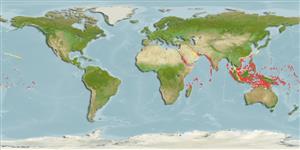>
Eupercaria/misc (Various families in series Eupercaria) >
Labridae (Wrasses) > Cheilininae
Etymology: Oxycheilinus: Greek, oxys = sharp + Greek, cheilos = lip.
More on author: Valenciennes.
Environment: milieu / climate zone / depth range / distribution range
Ecologia
marinhas associadas(os) a recifes; intervalo de profundidade 11 - 90 m (Ref. 128797), usually 30 - ? m (Ref. 9823). Tropical; 30°N - 15°S
Indo-Pacific: Red Sea to the Marshall Islands and Samoa. Western Indian Ocean: Mozambique (Ref. 41878).
Tamanho / Peso / Idade
Maturity: Lm ? range ? - ? cm
Max length : 21.0 cm TL macho/indeterminado; (Ref. 90102)
Espinhos dorsais (total) : 9; Raios dorsais (total) : 10; Espinhos anais: 3; Raios anais : 8 - 11. Recognized by the thin mid-lateral stripe and elongated blotch at front of dorsal fin between 1st and 3rd spines (Ref. 48636). Body covered with relatively large scales; large canine teeth in the front of jaws.
Found solitary (Ref. 90102) in caves of steep outer reef drop-offs from 25 to at least 46 m (Ref. 1602) with rich invertebrate growth such as large gorgonians or soft corals (Ref. 48636). Feeds mainly on fishes, shrimps and other crustaceans (Ref. 9823).
Ciclo de vida ou comportamento de acasalamento
Maturidade | Reprodução | Desova | Ovos | Fecundidade | Larvas
Oviparous, distinct pairing during breeding (Ref. 205).
Westneat, M.W., 2001. Labridae. Wrasses, hogfishes, razorfishes, corises, tuskfishes. p. 3381-3467. In K.E. Carpenter and V. Niem (eds.) FAO species identification guide for fishery purposes. The living marine resources of the Western Central Pacific. Vol. 6. Bony fishes part 4 (Labridae to Latimeriidae), estuarine crocodiles. FAO, Rome. (Ref. 9823)
Status na Lista Vermelha da UICN (Ref. 130435: Version 2024-1)
Ameaça para os humanos
Harmless
Uso pelos humanos
Pescarias: pouco comercial
Ferramentas
Relatórios especiais
Baixar XML
Fontes da internet
Estimates based on models
Preferred temperature (Ref.
123201): 25.4 - 28.6, mean 27.7 °C (based on 135 cells).
Índice de diversidade filogenética (Ref.
82804): PD
50 = 0.5020 [Uniqueness, from 0.5 = low to 2.0 = high].
Bayesian length-weight: a=0.01585 (0.00700 - 0.03587), b=2.95 (2.76 - 3.14), in cm total length, based on LWR estimates for this (Sub)family-body shape (Ref.
93245).
Nível Trófico (Ref.
69278): 3.9 ±0.64 se; based on food items.
Resiliência (Ref.
120179): médio(a), tempo mínimo de duplicação da população 1,4 - 4,4 anos (Preliminary K or Fecundity.).
Fishing Vulnerability (Ref.
59153): Low vulnerability (11 of 100).
Nutrients (Ref.
124155): Calcium = 69 [25, 158] mg/100g; Iron = 0.788 [0.284, 1.821] mg/100g; Protein = 18.7 [15.7, 20.8] %; Omega3 = 0.162 [0.082, 0.318] g/100g; Selenium = 29.7 [10.5, 88.8] μg/100g; VitaminA = 139 [42, 527] μg/100g; Zinc = 1.92 [0.84, 3.35] mg/100g (wet weight);
